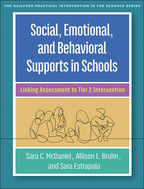Social, Emotional, and Behavioral Supports in Schools
Linking Assessment to Tier 2 Intervention
Sara C. McDaniel, Allison L. Bruhn, and Sara Estrapala
This title is part of The Guilford Practical Intervention in the Schools Series, edited by Sandra M. Chafouleas.
“Educational practitioners and preservice educators, this book is for you! I love the accessibility of this book and the straightforward guidance it provides. Without assuming extensive prior knowledge on the part of the reader, McDaniel, Bruhn, and Estrapala give a clear overview of each chapter, explain relevant concepts, and offer real-world examples and case studies of Tier 2 practices in action. It is evident how much care the authors have given to the unique challenges facing our students and educational systems today. This hopeful book allows us to see Tier 2 supports as uplifting and preventive—the way they are meant to be.”
—Rhonda N. T. Nese, PhD, Department of Special Education and Clinical Sciences, University of Oregon
“This book provides a deep dive into Tier 2 systems implementation, an area in which schools struggle. The authors are the top researchers and technical assistance providers in the field of PBIS as it relates to Tier 2 implementation. They have produced a detailed guide to setting up needed systems, practices, and data tools. Infused throughout the book is the importance of creating systems that are equitable, involve student choice/voice, and focus on student strengths. The authors offer excellent insights into how to promote maintenance and generalization of Tier 2 intervention effects, a topic often missing from other texts.”
—Leanne S. Hawken, PhD, BCBA, Emeritus Professor, Department of Special Education, University of Utah; CEO, Science of Mind and Behavior
“This book is a practical gem for educators, administrators, and school support staff. McDaniel, Bruhn, and Estrapala provide a clear and logical roadmap, offering step-by-step guidance that bridges theory and practice. The book's user-friendly approach ensures effective implementation of Tier 2 interventions to support students' social, emotional, and behavioral well-being. This book is a 'must have' for anyone dedicated to enhancing the learning environment and fostering students' emotional growth.”
—Tina M. Lawson, EdD, BCBA, educational consultant, Pennsylvania Training and Technical Assistance Network
“A much-needed and timely resource! A robust Tier 2 system is often the missing link in providing effective tiered supports to meet the needs of the whole child. The authors provide a practical approach that will save schools valuable time and resources. The no-cost or low-cost evidence-based interventions for the most common Tier 2 needs, such as self-regulation and co-occurring academic needs—paired with concrete examples and templates to aid with implementation and data-based decision making—are invaluable.”
—Tabathia Baldy, EdD, Mental Health and Wellness Program Manager, Georgia Department of Education
Table of Contents
Preface
1. Social, Emotional, and Behavioral Needs and Tier 2: Logic, Purpose, and Readiness 
2. Tier 2 Identification of Students and Their Needs
3. Tier 2 Data-Based Decision Making for Initial Intervention Decisions
4. Evidence-Based Interventions for Conduct Issues
5. Evidence-Based Interventions for Self-Regulation Issues
6. Evidence-Based Interventions for Social Issues
7. Evidence-Based Interventions for Emotional Issues, Gerta Bardhoshi
8. Integrating Academic and Social–Emotional–Behavioral Interventions at Tier 2, Stephen Kilgus, David Klingbeil, and Julia Porter
9. Data-Based Decision Making and Ongoing Adaptations at Tier 2
10. Technical Assistance to Facilitate Fidelity and Effectiveness at Tier 2
11. But Wait, There’s More: Final Thoughts on Important Topics to Ensure Tier 2 Success
References
Index
About the Authors
Sara C. McDaniel, PhD, is Professor of Special Education at the University of Alabama and Director of the Center for Interconnected Behavioral and Mental Health Systems. Dr. McDaniel conducts research, publishes, and leads educators in the areas of positive behavioral interventions and supports; classroom management assessment and coaching; Tier 2 social, emotional, and behavioral supports; and preventive treatments for diverse populations of students at high risk. She is the recipient of awards from the Association for Positive Behavior Support, the Council for Exceptional Children's Division for Research, and the University of Alabama, among other honors.Allison L. Bruhn, PhD, is Professor of Special Education at the University of Iowa, Executive Director of the Scanlan Center for School Mental Health, and Co-Director of the METRICS National Technical Assistance Center for supporting school mental health. A former middle school teacher, she is an associate editor of Journal of Positive Behavior Interventions and the developer of three mobile apps. Dr. Bruhn’s work focuses on designing, implementing, and evaluating interventions and assessments to improve outcomes for students with and at risk for emotional and behavioral disorders and the teachers who serve them. She is committed to bridging the research to practice gap by engaging educational stakeholders in relationship building, effective professional development, and collaborative research design and dissemination.
Sara Estrapala, PhD, is Assistant Research Professor in the Department of Special Education at the University of Missouri–Columbia. Her research focuses on Tier 1 and Tier 2 positive behavioral interventions and supports in high schools. She is particularly interested in studying student voice, self-regulation development, and usability and feasibility of implementation in the high school context. Dr. Estrapala has taught courses in functional behavioral assessment and in behavior and classroom management in elementary and high school settings. She is committed to translating research to practice by providing professional development for inservice and preservice teachers, writing for practitioner journals, and presenting at practitioner-focused professional conferences.
Contributors
Gerta Bardhoshi, PhD, Scanlan Center for School Mental Health, University of Iowa, Iowa City, IAStephen Kilgus, PhD, School Psychology Program, Department of Educational Psychology, University of Wisconsin–Madison, Madison, WI
David Klingbeil, PhD, School Psychology Program, Department of Educational Psychology, University of Wisconsin–Madison, Madison, WI
Julia Porter, MS, doctoral student, School Psychology Program, Department of Educational Psychology, University of Wisconsin–Madison, Madison, WI
